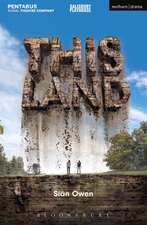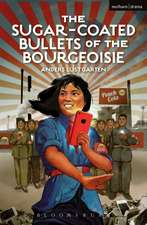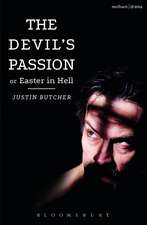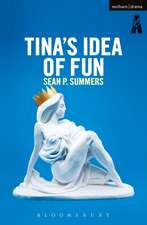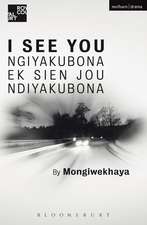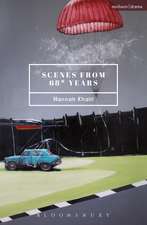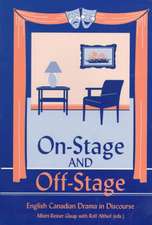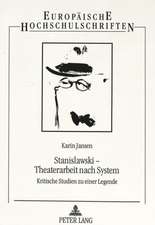The Man Who Had All the Luck: Penguin Classics
Autor Arthur Miller C. W. E. Bigsby, Christopher Bigsbyen Limba Engleză Paperback – 30 apr 2004 – vârsta de la 18 ani
The forgotten classic that launched the career of one of America's greatest playwrights
It took more than fifty years for The Man Who Had All the Luck to be appreciated for what it truly is: the first stirrings of a genius that would go on to blossom in such masterpieces as Death of a Salesman and The Crucible. Infused with the moral malaise of the Depression era, the parable-like drama centers on David Beeves, a man whose every obstacle to personal and professional success seems to crumble before him with ease. But his good fortune merely serves to reveal the tragedies of those around him in greater relief, offering what David believes to be evidence of a capricious god or, worse, a godless, arbitrary universe. David’s journey toward fulfillment becomes a nightmare of existential doubts, a desperate grasp for reason in a cosmos seemingly devoid of any, and a struggle that will take him to the brink of madness. This Penguin Classics edition includes an introduction by Christopher Bigsby.
It took more than fifty years for The Man Who Had All the Luck to be appreciated for what it truly is: the first stirrings of a genius that would go on to blossom in such masterpieces as Death of a Salesman and The Crucible. Infused with the moral malaise of the Depression era, the parable-like drama centers on David Beeves, a man whose every obstacle to personal and professional success seems to crumble before him with ease. But his good fortune merely serves to reveal the tragedies of those around him in greater relief, offering what David believes to be evidence of a capricious god or, worse, a godless, arbitrary universe. David’s journey toward fulfillment becomes a nightmare of existential doubts, a desperate grasp for reason in a cosmos seemingly devoid of any, and a struggle that will take him to the brink of madness. This Penguin Classics edition includes an introduction by Christopher Bigsby.
| Toate formatele și edițiile | Preț | Express |
|---|---|---|
| Paperback (2) | 72.21 lei 6-8 săpt. | |
| Bloomsbury Publishing – sep 2015 | 72.21 lei 6-8 săpt. | |
| Penguin Books – 30 apr 2004 | 85.27 lei 6-8 săpt. |
Din seria Penguin Classics
-
 Preț: 81.00 lei
Preț: 81.00 lei -
 Preț: 103.12 lei
Preț: 103.12 lei -
 Preț: 94.66 lei
Preț: 94.66 lei -
 Preț: 100.22 lei
Preț: 100.22 lei -
 Preț: 129.73 lei
Preț: 129.73 lei -
 Preț: 103.53 lei
Preț: 103.53 lei -
 Preț: 80.44 lei
Preț: 80.44 lei -
 Preț: 76.28 lei
Preț: 76.28 lei -
 Preț: 98.97 lei
Preț: 98.97 lei -
 Preț: 67.61 lei
Preț: 67.61 lei -
 Preț: 119.60 lei
Preț: 119.60 lei -
 Preț: 95.29 lei
Preț: 95.29 lei -
 Preț: 64.54 lei
Preț: 64.54 lei -
 Preț: 74.21 lei
Preț: 74.21 lei -
 Preț: 119.20 lei
Preț: 119.20 lei -
 Preț: 101.17 lei
Preț: 101.17 lei -
 Preț: 133.62 lei
Preț: 133.62 lei -
 Preț: 77.15 lei
Preț: 77.15 lei -
 Preț: 110.75 lei
Preț: 110.75 lei -
 Preț: 87.86 lei
Preț: 87.86 lei -
 Preț: 81.03 lei
Preț: 81.03 lei -
 Preț: 78.77 lei
Preț: 78.77 lei -
 Preț: 135.25 lei
Preț: 135.25 lei -
 Preț: 92.40 lei
Preț: 92.40 lei -
 Preț: 95.29 lei
Preț: 95.29 lei -
 Preț: 88.86 lei
Preț: 88.86 lei -
 Preț: 102.21 lei
Preț: 102.21 lei -
 Preț: 110.15 lei
Preț: 110.15 lei -
 Preț: 119.53 lei
Preț: 119.53 lei -
 Preț: 93.84 lei
Preț: 93.84 lei -
 Preț: 63.32 lei
Preț: 63.32 lei -
 Preț: 89.29 lei
Preț: 89.29 lei -
 Preț: 107.67 lei
Preț: 107.67 lei -
 Preț: 75.87 lei
Preț: 75.87 lei -
 Preț: 96.30 lei
Preț: 96.30 lei -
 Preț: 90.11 lei
Preț: 90.11 lei -
 Preț: 113.78 lei
Preț: 113.78 lei -
 Preț: 100.83 lei
Preț: 100.83 lei -
 Preț: 75.15 lei
Preț: 75.15 lei -
 Preț: 132.76 lei
Preț: 132.76 lei -
 Preț: 87.86 lei
Preț: 87.86 lei -
 Preț: 93.43 lei
Preț: 93.43 lei -
 Preț: 135.89 lei
Preț: 135.89 lei -
 Preț: 95.29 lei
Preț: 95.29 lei -
 Preț: 100.01 lei
Preț: 100.01 lei -
 Preț: 105.58 lei
Preț: 105.58 lei -
 Preț: 112.74 lei
Preț: 112.74 lei -
 Preț: 96.30 lei
Preț: 96.30 lei -
 Preț: 90.73 lei
Preț: 90.73 lei -
 Preț: 88.04 lei
Preț: 88.04 lei
Preț: 85.27 lei
Nou
Puncte Express: 128
Preț estimativ în valută:
16.32€ • 17.72$ • 13.71£
16.32€ • 17.72$ • 13.71£
Carte tipărită la comandă
Livrare economică 22 aprilie-06 mai
Preluare comenzi: 021 569.72.76
Specificații
ISBN-13: 9780142437865
ISBN-10: 0142437867
Pagini: 112
Dimensiuni: 130 x 196 x 10 mm
Greutate: 0.1 kg
Ediția:New.
Editura: Penguin Books
Seria Penguin Classics
ISBN-10: 0142437867
Pagini: 112
Dimensiuni: 130 x 196 x 10 mm
Greutate: 0.1 kg
Ediția:New.
Editura: Penguin Books
Seria Penguin Classics
Notă biografică
Arthur Miller (1915–2005) was born in New York City and studied at the University of Michigan. His plays include All My Sons (1947), Death of a Salesman (1949), The Crucible (1953), A View from the Bridge and A Memory of Two Mondays (1955), After the Fall (1963), Incident at Vichy (1964), The Price (1968), The Creation of the World and Other Business (1972) and The American Clock (1980). He also wrote two novels, Focus (1945), and The Misfits, which was filmed in 1960, and the text for In Russia (1969), Chinese Encounters (1979), and In the Country (1977), three books of photographs by his wife, Inge Morath. His later work included a memoir, Timebends (1987); the plays The Ride Down Mt. Morgan (1991), The Last Yankee (1993), Broken Glass (1994), and Mr. Peter's Connections (1999); Echoes Down the Corridor: Collected Essays, 1944–2000; and On Politics and the Art of Acting (2001). He twice won the New York Drama Critics Circle Award, and in 1949 he was awarded the Pulitzer Prize. Miller was the recipient of the National Book Foundation’s 2001 Medal for Distinguished Contribution to American Letters, the Prince of Asturias Award for Letters in 2002, and the Jerusalem Prize in 2003.
Caracteristici
2015 is a major year for Arthur Miller since it marks the centenary of his birth and, subsequently, features some landmark theatrical productions and publishing
Recenzii
You can feel Miller exploring the theatrical terrain he was to make uniquely his own
It is illuminating as a taster of themes that would return in Miller's work - father-son and brother-brother relationships, disappointment, the dubiousness of the American Dream, the hollow happiness of wealth - but here it also comes out as a piece about spiritual unease, about the deep disquiet of a man who cannot discern purpose or justice in life
Arthur Miller was 24 when he wrote this rich, passionate and compassionate play ... it should rank with Miller's greatest.
Listen to the dialogue: no other American dramatist has this feel for the ordinary talk of ordinary people, or the knowledge of what they do. This is more than a writer's craft, it is a psychological and moral openness to humanity, an act not of imitating, but of sharing.
It's the Arthur Miller play that slipped through the net . . . As well as featuring his trademark dialogue - compelling, funny, full of ideas - it is also a grand experiment in which the playwright reverses the usual journey of a tragic hero.
It is illuminating as a taster of themes that would return in Miller's work - father-son and brother-brother relationships, disappointment, the dubiousness of the American Dream, the hollow happiness of wealth - but here it also comes out as a piece about spiritual unease, about the deep disquiet of a man who cannot discern purpose or justice in life
Arthur Miller was 24 when he wrote this rich, passionate and compassionate play ... it should rank with Miller's greatest.
Listen to the dialogue: no other American dramatist has this feel for the ordinary talk of ordinary people, or the knowledge of what they do. This is more than a writer's craft, it is a psychological and moral openness to humanity, an act not of imitating, but of sharing.
It's the Arthur Miller play that slipped through the net . . . As well as featuring his trademark dialogue - compelling, funny, full of ideas - it is also a grand experiment in which the playwright reverses the usual journey of a tragic hero.






